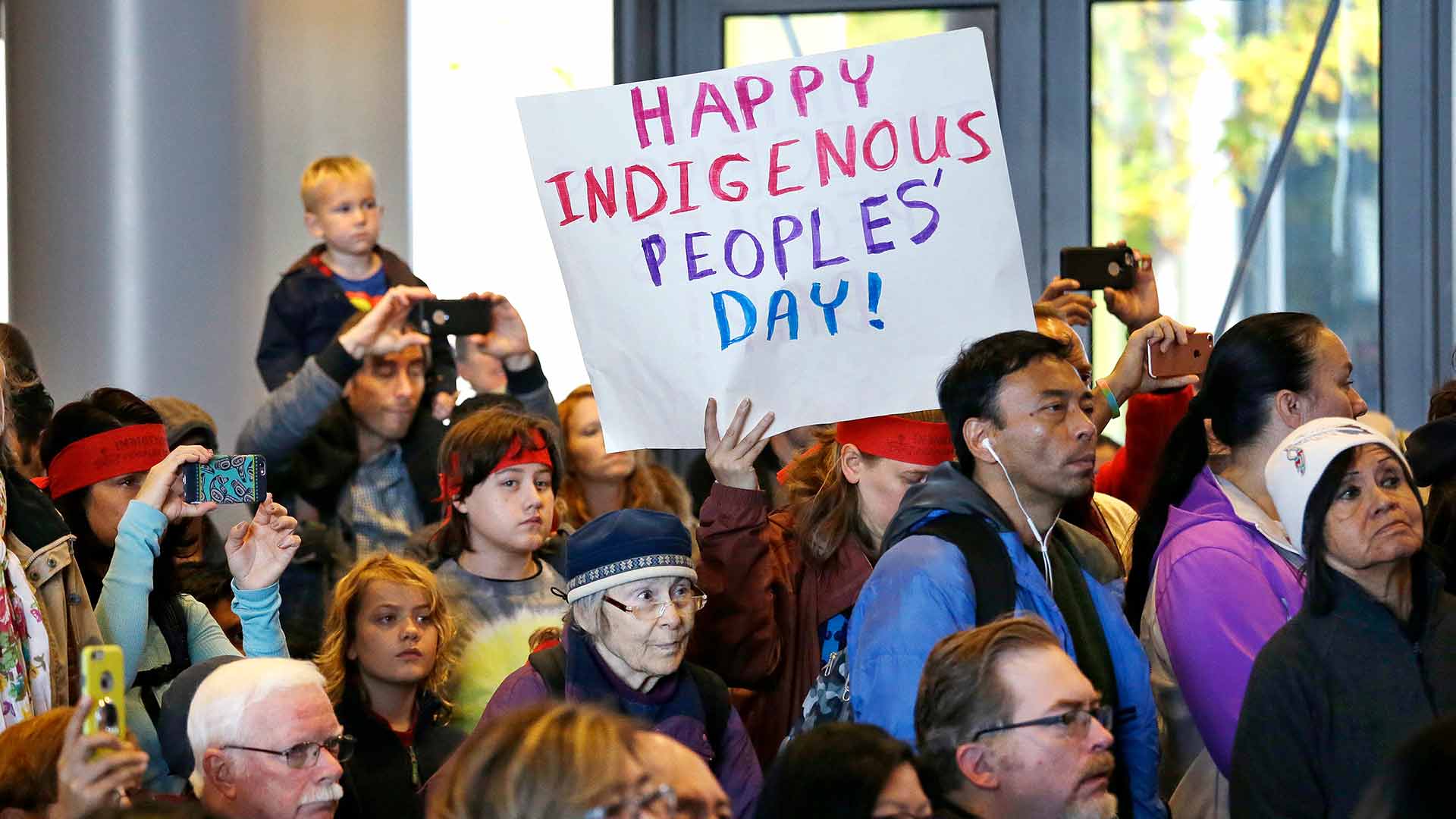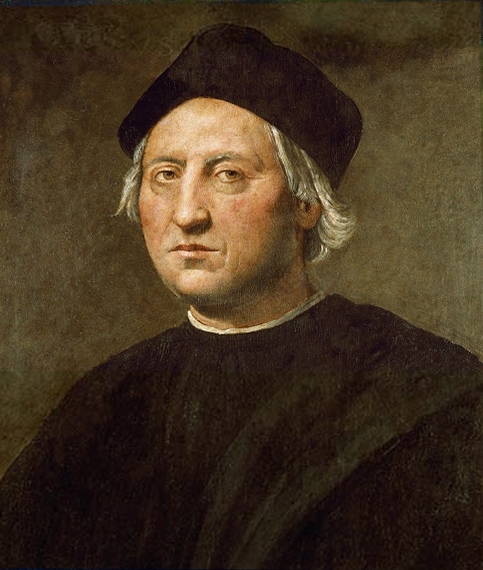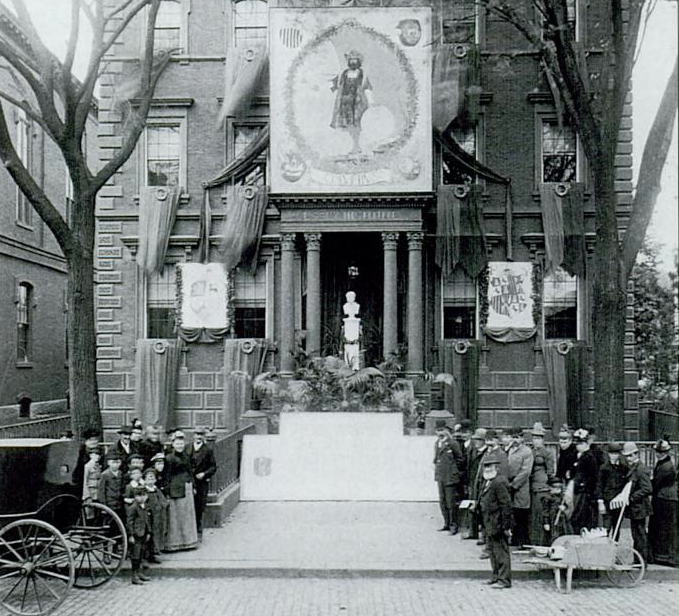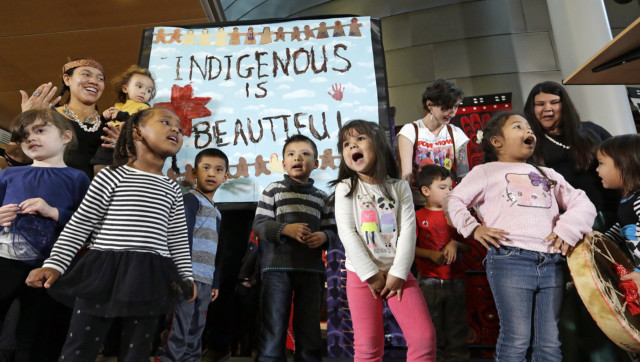W
hat is Indigenous People’s Day?
“Indigenous People’s Day” is a name proposed by some groups to replace Columbus Day in the United States.
It’s celebrated in many cities, and most recently in the U.S. state of Vermont.

People look on at a celebration of Indigenous Peoples’ Day Monday, Oct. 10, 2016, at Seattle’s City Hall. Seattle began observing Indigenous Peoples’ Day in 2014 to promote the well-being and growth of Seattle’s American Indian and Indigenous community. (AP Photo/Elaine Thompson)
Vermont Gov. Peter Shumlin issued a proclamation Monday rebranding Columbus Day to Indigenous People’s Day in honor of the “sacrifice and contributions of the First Peoples of this land,” including the Abenaki people, their ancestors and allies.
The renaming celebrates “indigenous heritage and resiliency,” he added.
Shumlin’s proclamation only applies to this year.
Last week Phoenix became the largest city to recognize Indigenous Peoples’ Day after a city council vote made it official.
South Dakota also doesn’t celebrate Columbus Day. In 1990, the state declared the second Monday in October Native Americans Day.
Dozens of other cities have also approved the name change in recent years, including Denver, Minneapolis, and Seattle.
W
hy don’t people want to honor Christopher Columbus?

Portrait of Christopher Columbus by Ridolfo Ghirlandaio, circa 1520.
Many people believe Christopher Columbus’ legacy to be synonymous with genocide and colonization of native peoples in the Americas.
Honoring the explorer fails to recognize the costs of Columbus’ failed campaign to find a water route from Europe to Asia.
In his expeditions to the New World, Columbus’ aim was to find gold and salves, writes Historian Howard Zinn.
His crew traveled the Caribbean taking native people captive.
“In two years, through murder, mutilation, or suicide, half of the 250,000 Indians on Haiti were dead,” Zinn writes of Columbus’ 1495 campaign.
Native American groups and other critics have also cited the legacy of European settlement that Columbus’ voyages initiated.
“I don’t think it’s appropriate to celebrate racism,” said Tessa McLean, a member of the American Indian Movement of Colorado, told Indian Country Today.
“He represents domination, forced assimilation, genocide. He brought rape and murder to our women, and it’s just inappropriate to celebrate that as something positive.”
I
s Columbus Day dead?
No, not for a while anyway.
Columbus Day has been known widely since 1892, when U.S. President Benjamin Harrison called for the celebration on the 400th anniversary of year Columbus arrived in the New World.
It was made a federal holiday in 1937 and celebrated on Oct. 12 until it was later moved to the second Monday in October.
Many Italian-Americans, including the Knights of Columbus, pushed for the day as a way to recognize their heritage and contributions to the United States.

Daland House, Columbus Day, Salem, Massachusetts,1892. Source: Kenneth C. Turino, Stephen J. Schier (Arcadia Publishing, 1998)
However while federal workers get the day off, only 23 states actually make it a paid holiday, according to a 2015 study by the Pew Research Center.
I
s there an Indigenous Day movement in other countries?
Many Latin American countries that had celebrated Columbus Day have renamed the holiday, according to an article by Indian Country Today.
The newspaper said that Argentina celebrates Día del Respecto a la Diversidad Cultural (Day of Respect for Cultural Diversity).
In Nicaragua and Venezuela, the day was renamed Día de la Resistencia Indigena (The Day of Indigenous Resistance), Indian Country today reported.
In Chile they call the holiday El Día del Encuentro de dos Mundos (The Day of the Encounter Between Two Worlds).
Since 1994, the United Nations has also recognized August 9 as “World Indigenous People’s Day.”
The U.N. estimates that there are 370 million indigenous people in the world in 90 countries.
Indigenous people make up less than 5 percent of the world population, but account for 15 percent of the poorest people in the world, according to the U.N.
They also speak the overwhelming majority of the world’s 7,000 languages.
Story by CCTV America with information from the Associated Press
 CGTN America
CGTN America Preschool children from the Daybreak Star Center perform at a celebration of Indigenous Peoples’ Day Monday, Oct. 10, 2016, at Seattle’s City Hall. Seattle began observing Indigenous Peoples’ Day in 2014 to promote the well-being and growth of Seattle’s American Indian and Indigenous community. (AP Photo/Elaine Thompson)
Preschool children from the Daybreak Star Center perform at a celebration of Indigenous Peoples’ Day Monday, Oct. 10, 2016, at Seattle’s City Hall. Seattle began observing Indigenous Peoples’ Day in 2014 to promote the well-being and growth of Seattle’s American Indian and Indigenous community. (AP Photo/Elaine Thompson)
